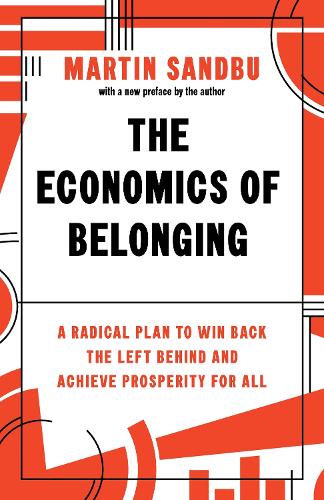
Martin Sandbu’s basic thesis in The Economics of Belonging is simple: Western liberal democracy (essentially, the post Second World War socio-economic model) is under threat from within, owing to a significant proportion of western electors losing confidence in it; this loss of confidence is caused by the erosion of a sense of economic belonging, which is the result of decades of economic mis-management by Western governments; and, if the threat is to be dealt with, these governments need to adopt a package of policies radically different from those that have been adopted to date.
The book is sub-titled “A radical plan to win back the left behind and achieve prosperity for all” and, having spent five chapters setting out and defending his view of what has gone wrong, in the remainder of the book, Sandbu sets out a long list of ideas for dealing with the issue he has identified: the establishment of what he calls a “high pressure economy” (involving fiscal and monetary policy designed to keep demand pressure high and other policies to secure high minimum wages); the introduction of universal basic income (UBI); the introduction of a meaningful wealth tax; the removal of tax relief for debt; the strengthening of collective bargaining (including giving unions bargaining rights on behalf of non-members); the provision of significant subsidies to disadvantaged regions; and a host of other, less dramatic, initiatives. He commends governments which, during the Covid pandemic, pursued policies “bolder than anything ever seen in peacetime” (page xii) and his only criticism of the asset purchase programme of the past decade is that it has not gone far enough. He wants more of the same sorts of economic stimuli and much more besides.
Sandbu is a Financial Times journalist and, although the book does not indicate its target audience, it gives the impression that it is aimed at the kind of people who might read the FT. They are certainly the kind of people who are likely to enjoy, and potentially benefit, from reading it. Economists will not find much new in it and, conversely, those who are not used to thinking about socio-economic matters may struggle with some of the analysis. However, non-specialists who are used to thinking about such matters should find it a worthwhile read especially since it deals with an issue that should be a great concern to anyone who values Western liberal democracy: the concern that Western electorates might become so discontented that they themselves destroy it.
This is not to say that the book can be given an unequivocal recommendation. It needs to come with a health warning: Sandbu writes well and with great conviction and there is a danger that readers will fail to notice leaps of logic and inadequately supported assertions that litter the book. Paradoxically, this danger is particularly acute because Sandbu commendably frequently mentions at least some of the main concerns about his proposed policies. The problem is that it is easy to miss the fact that, having raised some concerns, he often does not deal with them adequately or does not mention other material concerns. For example, although he acknowledges that there is risk associated with his proposed “high pressure economy”, he does not properly examine the nature and extent of this risk (e.g. the serious role of inflation and its consequences) let alone discuss how it can be mitigated. Furthermore, he never considers the issues associated with the transition from existing policies to those proposed by him. Those in the UK who remember Chancellor Anthony Barber’s “dash for growth” in the early 1970s or who have reflected on the impact of Kwasi Kwarteng’s disastrous recent budget will recognise that these are serious omissions.
In some cases, the absence of adequate analysis of potential issues results in Sandbu’s proposals seeming to be surprisingly naïve. For example, his arguments for the UBI are interesting and worth considering. However, his defence against the counter-argument that its cost would be exorbitant is that previous calculations have shown that a basic income of £6,700 for a couple with two children could be provided by abolishing tax-free income tax allowance (page 120). This may be true but Sandbu fails to explain how a basic income of this amount would provide the economic security that he is seeking.
Another example of apparent naivety is provided by his suggestions relating to collective bargaining and the role of trade unions. He acknowledges that the role of trade unions has not always been beneficial and that they can be a barrier to change and he recognises that what is needed is unions that “function well” (page 122). However, he fails to explain how it is that this can be secured. Once again, those with long memories will wonder how his proposals would avoid a return to the industrial paralysis of the 1970s in the UK.
On occasions, the book contains hints of romanticism or, at least, rose tinted spectacles. President Roosevelt and the post-war politico-economic consensus are its particular heroes. In fact, a reader who is unaware of post war history could be forgiven for believing that the period from the end of the Second World War down to the last 20 or 30 years was one of universal contentment and satisfaction. Unfortunately, the social tensions, economic problems and, in particular, industrial relations chaos of the 1960s to 1980s, tell a different story. Furthermore, some of Sandbu’s proposals seem worthy rather than realistic and world changing. Among these are his proposal for community banks (page 163), which are surely never going to have more than a marginal role in the economy, and his extoling of the merits of libraries and arts institutions (page 200), which one suspects are rather too middle class to deal with the problem of belonging which Sandbu is addressing.
Perhaps the reality is that Sandbu has tried to cram too much into 239 pages, with the result that his has been guilty of superficiality and a lack of convincing analysis. This is frustrating because he commendably takes issue with those who, simplistically, see globalisation or immigration as the cause of our current problems and, taken individually, a number of his points are interesting. For example, his defence of a net wealth tax as an alternative to other taxes is worthy of consideration and Switzerland provides an example supporting Sandhu contention that his proposal is not necessarily about high taxes. Likewise, his arguments in relation to the removal of tax relief for debt are powerful are supported by a number of respected economists.
These are, however, points of detail and Sandbu is not inviting us to tinker with the detail of our existing economy but adopt his radical package of change. He is clearly convinced that he is right in advocating it but one needs to ask whether all Western governments over the past general have really been quite as stupid as he believes. It is at least worth considering whether there might be a reason why his policy prescriptions have nowhere been implemented. He admits that the problem of belonging exists in almost all Western countries (pages 58-62) despite them having pursued very different policies over the years (e.g. contrast the USA, France and Sweden). Furthermore, although Sandbu is surely right that there is a problem relating to people feeling alienated (i.e. having lost their sense of belonging) and that economic factors have played a large part in the creation of this problem, his dismissal of cultural issues as a material contributor to the problem and his assertion that, despite globalisation, the solution largely lies in the hands of national governments (page 181) may justifiably be challenged.
That said, Sandbu rightly sounds a warning siren and those who cannot accept his prescription for dealing with the current Western malaise need to ask themselves what their solution to the problem is.
“The Economics of Belonging” by Martin Sandbu was published in 2020 (the paperback edition being published with a new preface in 2022) by Princeton University Press (ISBN-13:9780691228907). 239pp.
 Richard Godden is a Lawyer and has been a Partner with Linklaters for over 25 years during which time he has advised on a wide range of transactions and issues in various parts of the world.
Richard Godden is a Lawyer and has been a Partner with Linklaters for over 25 years during which time he has advised on a wide range of transactions and issues in various parts of the world.
Richard’s experience includes his time as Secretary at the UK Takeover Panel and a secondment to Linklaters’ Hong Kong office. He also served as Global Head of Client Sectors, responsible for Linklaters’ industry sector groups, and was a member of the Global Executive Committee.